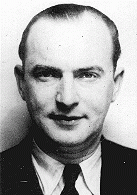You searched for: krakow
<< Previous | Displaying results 91-100 of 152 for "krakow" | Next >>
-
Gross-Rosen
ArticleLearn about the Gross-Rosen camp, including its establishment, prisoner population, subcamps, forced labor, and liberation.
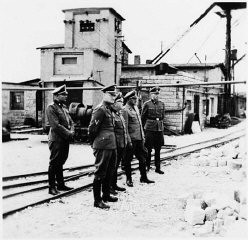
-
Einsatzgruppen and other SS and Police Units in the Soviet Union
ArticleLearn more about how and why Nazi German SS and police units, including the Einsatzgruppen, perpetrated mass killings of Jews in the occupied-Soviet Union.
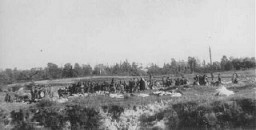
-
Rejoice, Make Merry, Children
SongMordecai Gebirtig, born in 1877 in Krakow, Poland, was a Yiddish folk poet and songwriter. Gebirtig had three daughters, for whom he wrote and performed his poems. The words were set to improvised melodies, and most of his songs resemble entries in a diary. Many of Gebirtig's poems contain themes of eastern European Jewish life in the 1920s and 1930s. The lyrics to "Rejoice, Make Merry, Children" contain a springtime motif that recurred in other Gebirtig works. In the lyrics, an elderly narrator urges…
-
Miriam Peleg explains why Żegota was important
Oral HistoryMiriam Peleg (1913–1996) was a member of the Council for Aid to Jews, codenamed “Żegota.” Żegota was a clandestine rescue organization of Poles and Jews in German-occupied Poland. Supported by the Polish government-in-exile, Żegota coordinated efforts to save Jews from Nazi persecution and murder. It operated from 1942 to 1945. Born Maria Hochberg, Miriam was from a Polish-Jewish family. She grew up in a small town about 70 miles east of Kraków. As early as the summer of 1940, Miriam obtained…
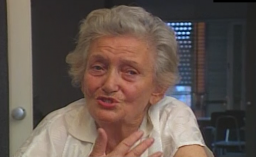
-
Fred Bachner describes flight to eastern Poland upon the German invasion of Poland in September 1939
Oral HistoryFred was born to Polish Jewish parents in Berlin, where his father owned a factory. After the Kristallnacht ("Night of Broken Glass") pogrom in November 1938, Fred's father and brother were deported to Poland. It was not until June 1939, when Poland allowed Fred and his mother to enter the country, that the family was reunited in Krakow. Fred and his family tried to flee upon the German invasion of Poland in September 1939 but were told to return to their homes. They were forced into the Krakow ghetto, and…

-
Ludmilla Page describes conditions in Oskar Schindler's munitions factory in Brünnlitz
Oral HistoryLudmilla was born to an assimilated Jewish family in Kishinev, Romania. She and her mother, a physician, were living in Poland when the Germans invaded on September 1, 1939. They were taken to Krakow. Ludmilla was forced to live in the Krakow ghetto; her mother was sent to the Warsaw ghetto. Ludmilla worked in a factory at the Plaszow labor camp for a businessman who was a friend of the German industrialist Oskar Schindler. In October 1944, Schindler attempted to save some Jewish workers by relocating them…
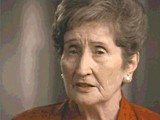
-
Leah Hammerstein Silverstein describes starvation in the Warsaw ghetto
Oral HistoryLeah grew up in Praga, a suburb of Warsaw, Poland. She was active in the Ha-Shomer ha-Tsa'ir Zionist youth movement. Germany invaded Poland in September 1939. Jews were forced to live in the Warsaw ghetto, which the Germans sealed off in November 1940. In the ghetto, Leah lived with a group of Ha-Shomer ha-Tsa'ir members. In September 1941, she and other members of the youth group escaped from the ghetto to a Ha-Shomer ha-Tsa'ir farm in Zarki, near Czestochowa, Poland. In May 1942, Leah became a courier…
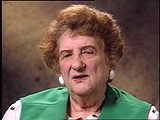
-
Leah Hammerstein Silverstein describes bombings in Praga and Warsaw after the outbreak of World War II
Oral HistoryLeah grew up in Praga, a suburb of Warsaw, Poland. She was active in the Ha-Shomer ha-Tsa'ir Zionist youth movement. Germany invaded Poland in September 1939. Jews were forced to live in the Warsaw ghetto, which the Germans sealed off in November 1940. In the ghetto, Leah lived with a group of Ha-Shomer ha-Tsa'ir members. In September 1941, she and other members of the youth group escaped from the ghetto to a Ha-Shomer ha-Tsa'ir farm in Zarki, near Czestochowa, Poland. In May 1942, Leah became a courier…
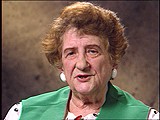
-
Leah Hammerstein Silverstein describes the emotions she felt upon arrival in Tel Aviv and Jerusalem after the war
Oral HistoryLeah grew up in Praga, a suburb of Warsaw, Poland. She was active in the Ha-Shomer ha-Tsa'ir Zionist youth movement. Germany invaded Poland in September 1939. Jews were forced to live in the Warsaw ghetto, which the Germans sealed off in November 1940. In the ghetto, Leah lived with a group of Ha-Shomer ha-Tsa'ir members. In September 1941, she and other members of the youth group escaped from the ghetto to a Ha-Shomer ha-Tsa'ir farm in Zarki, near Czestochowa, Poland. In May 1942, Leah became a courier…
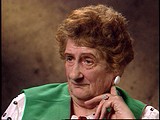
-
Morris Zaidband
ID CardMorris was one of five children born to a Jewish family in the Polish town of Oswiecim, 33 miles west of Cracow [Krakow]. Morris' father sold ladies' undergarments. Morris worked as a jeweler. 1933-39: In September 1939 Germany invaded Poland. Morris's family started to flee eastward but two weeks later the Germans overtook them and they were sent home. When they returned, the Germans were already beating Jews who didn't show them "respect." One day, when German guards came to their house to deport…
